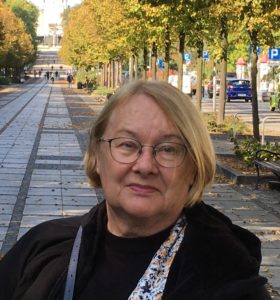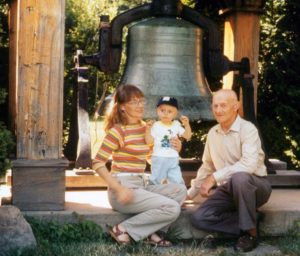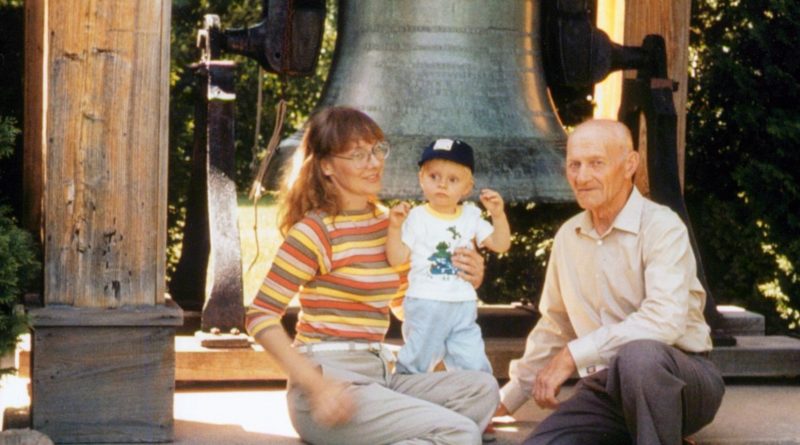Interview with Ms. Anna Domaradzka
Date of the interview : March 1st, 2022
 Anna Teresa Domaradzka, daughter of Leopold Kulesza, one of the Polish Children of Siberia.
Anna Teresa Domaradzka, daughter of Leopold Kulesza, one of the Polish Children of Siberia.
Born in 1953 in Łapy, Podlasie.
Graduated from college in the nearby town of Białystok.
She worked for a year for a secondary school in Białystok until she moved to Warsaw to obtain a master’s degree in Polish Studies at Warsaw University.
After graduating, she started working at the Library in Warsaw University.
In 1979, she married Julian Andrzej Domaradzki.
In September 1981, she and her husband left Poland for his academic scholarship to the United States to Princeton, for a period of about two years.
However, after martial law was declared in Poland in December 1981, they decided to stay there a little longer.
Today, more than 40 years later, still living in the United States, they have settled in Los Angeles.
They have two children, Matthew born in 1982 in Princeton (New Jersey State) and Julia born in 1985 in Seattle (Washington State).
Their son currently lives in New York and their daughter lives in Los Angeles, California.
First of all, I would like to ask you,
if you could tell me the relationship that you had with your father and which kind of person he was.
My father was a good, honest and responsible man, but also rather reserved.
When I was born, he was already 45 years old so I was born quite late in his life,
but I think this brought undoubted benefits for me as well, he always had a lot of time for me.
My father was a calm, balanced, hard-working, reserved man, but at the same time very curious about the world.
His life experience gave him a different perspective.
Being born in Siberia, experiencing the war and coming back to Poland and also the occupation of the German Army.
He was a very cautious person, careful with his words and actions, but at the same time very determined and courageous.
He always told me these different stories, from stories from his childhood, then from Japan, in the place where I was born,
then his stories about the United States and coming back to Poland.
Among all those stories given by him to me, I noticed there wasn’t much about the first few years in Poland.
I don’t know why, maybe his memories were not pleasant and he didn’t want to remember.


I also had the opportunity to interview three more people from the family of the Siberian Children.
I understand that not all the memories weren’t pleasant for them.
But at the same time, this Ukrainian situation made me even close to understand how it is
because I also see fathers and brothers sending only mothers and children to Poland.
We’re in a very similar situation.
It is shocking to recognize how history has a tendency to repeat itself.
Many children had to flee from an absolutely unacceptable tragic situation via Japan to the United States in the 1920s.
Being 69 years old, I never expected that I would see war in my life again.
In the current situation where mothers with children are fleeing Ukraine,
this is the same concept of refugee and children of the war in my experience.
What is heartbreaking for me, is to tell and let the children understand what’s going on in their home country.
I am very impressed to see Poland is doing such a great job accepting all refugees coming to Poland.
Not only is there help from the government, but also from public and private institutions,
and individual people that are opening houses, accepting people in their homes.
These are beautiful activities.
Yes. Also I hope we have this good relationship between Japan and Poland like 100 years ago.
I really hope that this will be the beginning of a closer relationship between the two countries.
By the way, do you know why your father studied gardening in his school in 1922?
I was really curious when I was reading the book.
When my father and his two sisters were children, they were the oldest in the group.
My father’s older sister got employed very quickly in the city of Poznań.
So my father got into a vocational school in Koźmin nearby Poznan, and he was getting prepared for the job.
I’m pretty sure that it wasn’t his decision to be prepared for employment not going to Wejherowo but it was almost a fate for all Siberian Children.
The only thing I know is that he never went through Wejherowo nor Poznań because he went to the botanical school.
However, another thing I would like to point is, all his life he really enjoyed being with nature.
He could talk long about the trees, plants around the house, that was his passion.
It is possible that his surroundings thought that he is the one who should go to the school,
and it would be a good idea for him to learn more about gardening or it was just a random choice by chance.
Have you ever heard your father mention about the memory of nature in Japan?
I remember him talking about Japanese gardens and parks.
He always mentioned how beautiful the greens there looked, how nicely trimmed and manicured the plants there were.
Besides, it was from my father that I first heard about the Japanese cherry blossom.
He told me how the trees, including the Japanese cherry tree, were planted according to a specific plan.
I also remember him telling me about the houses. He told me that it was a simple construction aimed at the functions of daily life.
I also remember him recalling many times his memory of sitting down in the dining room at a low Japanese chabudai table and eating with wooden chopsticks.
I remember you mentioned that you visited Japan.
What was the first impression?
It was the most delightful visit even though I didn’t expect the visit to happen.
My husband had to visit Nara for his business so I accompanied him and flew to Japan.
From Nara I took a train to Tsuruga.
I didn’t expect that people would be so nice to me only because of the fact of being the daughter of one of those Siberian children.
I remember mostly about two things.
One is Tsuruga Muzeum. I visited that place before the new building was built.
There was a wall with stories of Siberian Children.
I totally didn’t expect that there would be something like that.
For the first time in my life, I saw a few big pictures and stories about children arriving in Tsuruga.
Unfortunately, there is still nothing like this in Poland.
I must also mention the warm welcome given to me by the Mayor of Tsuruga at the time,
which was an unforgettable experience.
Another thing was that there was a younger man from Tsuruga city
and he was driving by the local school with me and told me that
that is exactly the same school where those children after arriving in Tsuruga visited after their arrival to this town.
Also he told me that he has graduated from that school.
This school is to me somehow the symbol, the first step of this Siberian Children into Japanese soul.
Absolutely wonderful that it is still in existence.
I hope children at that school are still learning about the history of Siberian Children.
Maybe in the future I would like to visit the new muzeum.
The town of Tsuruga was and is an amazing, special place for me in Japan.
Where do you want to visit the most in Japan other than the new museum in Tsuruga?
Definitely Tokyo.
I would like to go and see Fukudenkai, the place where those children stayed.
I think it was 2001 when I first visited Japan with my husband for two weeks and I had enough time by myself to wander around.
I still remember walking to the park in Tokyo, and coming upon the Royal Palace.
I then remembered my father’s story about the Empress of Japan.
Empress Sadako left the Palace for the first time in her life to greet the Siberian Children at the Red Cross headquarters.
Even now this makes a huge impression on me.
Now that I have become more familiar with the stories of the Siberian Children,
I would like to revisit all those places that he and his sisters previously met in Tokyo.
20 years have passed since the last visit. It would be a completely different visit than last time.
I wanted to know if you have any contact with your relatives.
For example, do you have an opportunity to talk about family history?
Or maybe it is not something very happy to be discussed among the family?
The thing is that my father’s family was not so big like my mother’s family.
His family was small because they were coming to Siberia, back to Poland and they were relatively isolated.
Speaking about my father’s sister, the oldest sister got married, never had children, her father and her husband perished in concentration camps.
The other one I kept in contact with has already lost her husband.
There is a great-grandchild, I was trying to reach him but I couldn’t. I have heard that he is staying somewhere in the west of Poland or Europe.
The fourth brother, the one who didn’t go through Japan and the US, came back to Poland with his parents, had two daughters and a grandson.
One of the daughters passed away, but I keep a very close contact with the younger one.
I gave her all the papers from the conference in the Polish parliament.
She’s absolutely excited and thrilled to hear about what was the story of our family.
I have two children and both of them are here in the United States.
They like history and when there was a conference in Parliament, they flew from the United States to Poland just for this conference.
It was great that there was an English translation on the handout so that they could understand the content since their Polish is not as good as their English.
I was even surprised that from the very beginning of the conference to the very end,
they had headphones on their head and just so intensively listened to whatever was said in the Polish parliament during that conference.
They were the last ones to leave the conference room.
This was an absolutely stunning and wonderful experience for them.
To hear the story from their mother is one way but to hear the story being presented in public is another thing.
Not only knowing the individual’s story,
but also the different speakers telling about this history in different aspects was absolutely fantastic experience for them.
Have they got any chance to visit Japan?
My son was in Japan but it was a business trip.
So he was very busy at that time and couldn’t visit Tsuruga nor Fukudenkai.
Am I correct to understand that they didn’t hear any stories directly from your father?
They were too young and maybe don’t remember well but I taped my father telling his story.
That was a very short history of leaving Siberia and coming back to Poland.
Though it’s just a few sentences, I treasured this very much.
Truth is that growing up and hearing these stories, especially when you’re young, you pay attention,
but you don’t do anything about this since you’re preoccupied with your life and very busy.
I was always eager to tell this special story to my friends and anyone who wanted to listen.
Now all I have left are recordings, occasional notes and selective documents and a few old cards.
Meanwhile, as I have grown older, this family story has become something special to me
and I have felt obliged to write it down, what I remember and what remains of them.
That’s the same with children. I think they have to grow up and be ready to understand this.
Thank you for letting us also learn a lot of things.
We are actually starting another panel exhibition about the history of Siberian Children tomorrow.
We need the voice of descendants to our exhibition and any other events so that people will be interested.
Regarding the ceremony scheduled for this September, what are your expectations?
From my perspective, as a descendant of Siberian children, I am thrilled to see other people like me.
We’re getting older so I would like to talk to them a lot now.
The second point is to make the story well known among Polish and Japanese people, more seen in the public media.
The friendship between Japan and Poland began 100 years ago, and I feel that by helping evacuated children by the recent war in Ukraine,
Poland is returning the favor it received in the past.
That’s a chain of events which is getting bigger and bigger that produces something positive, something wonderful.
You can look up how a human spirit could help another one. Suddenly there is a war in Ukraine.
You never know what will happen.
Actually I, as a descendant of Siberian Children, are the first generation without experiencing war.
I was born in the 50s in Poland.
There was a war in Korea and Vietnam of course, but personally around us, there was no war.
I never thought that something that is currently happening in Ukraine will happen.
It’s very important for people to cherish what we got, and to see how important it is to have democracy.
People are damaged very quickly by so many circumstances, but we have to be very careful to cherish this, too.
This is most important because this peace and democracy could be broken very quickly.
To rebuild it takes not only one generation, but a few generations.
Besides, the life of many people need to be rebuilt.
This shows people how important your freedom is, your democracy, your life, when you respect other people not to get involved in.
History likes to repeat itself.
I believe that the history of the Siberian Children should be told so that the same sad history will not be repeated by people.
No one has the right to destroy the peace that our ancestors fought for and won in a short period of time.
I think this is a very important message.
To conclude the interview, is there anything you would like to say to the younger generation?
Be careful. Take care of democracy and freedom.
That you can lose everything in an instant and it can affect not only you but everyone around you, and it can even lead to war.
The most important thing to me is children.
They are innocent.
They do not understand what is happening.
It will be difficult for them to understand that their parents are fighting for their freedom.
The peace that the previous generation has built can be destroyed really easily.
Make a good future for the next generation.
Saving the life of one person around you is wonderful,
but the feat of the Siberian Children Rescue Committee to save nearly 1,000 children in an organized manner is truly an act of humanity.
I believe it is a feat that surpasses anything else. It is the most amazing act that a human being can accomplish.
Please protect a world where people can live in a democracy.
No power has the right to take that away and must not be allowed to do so.

